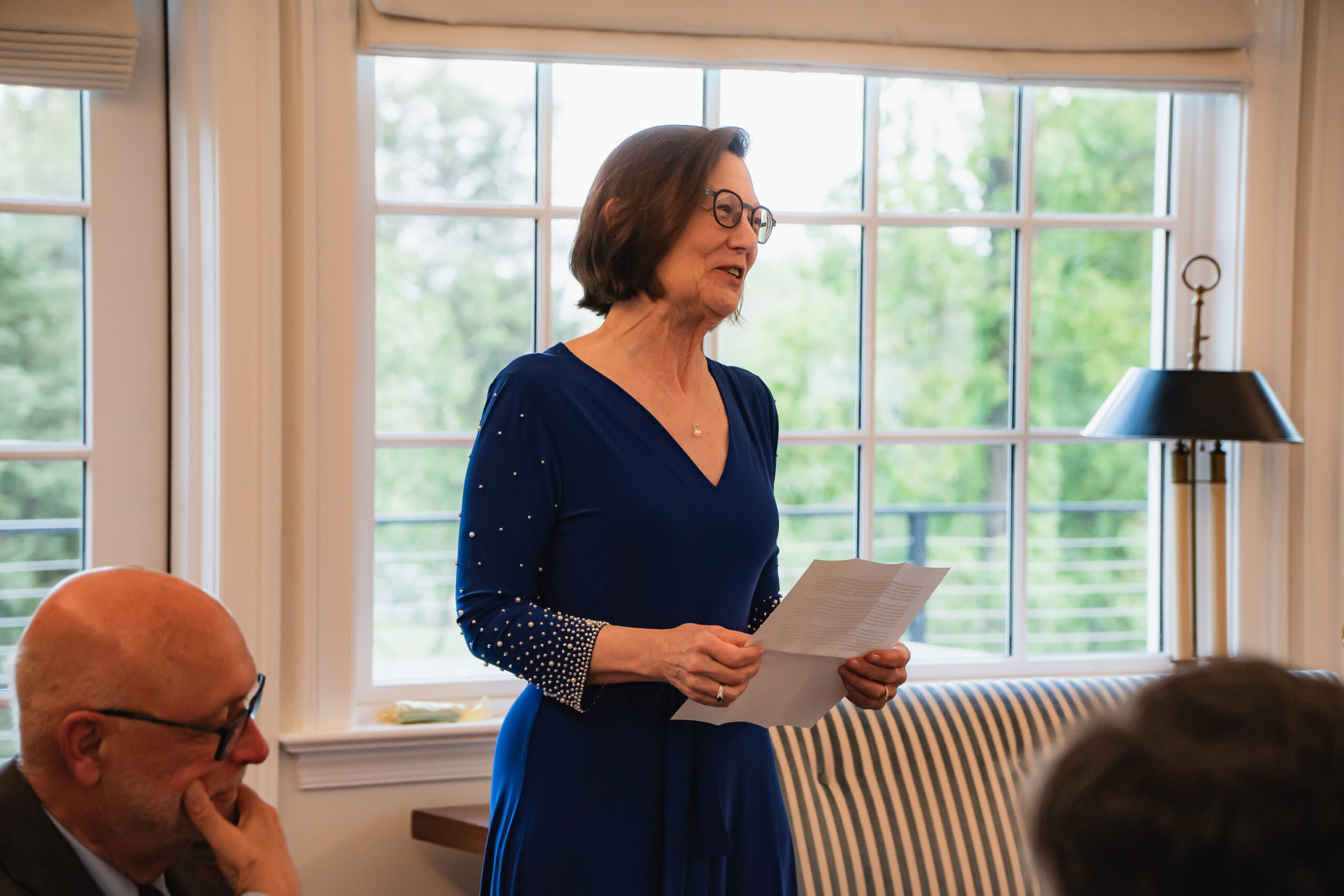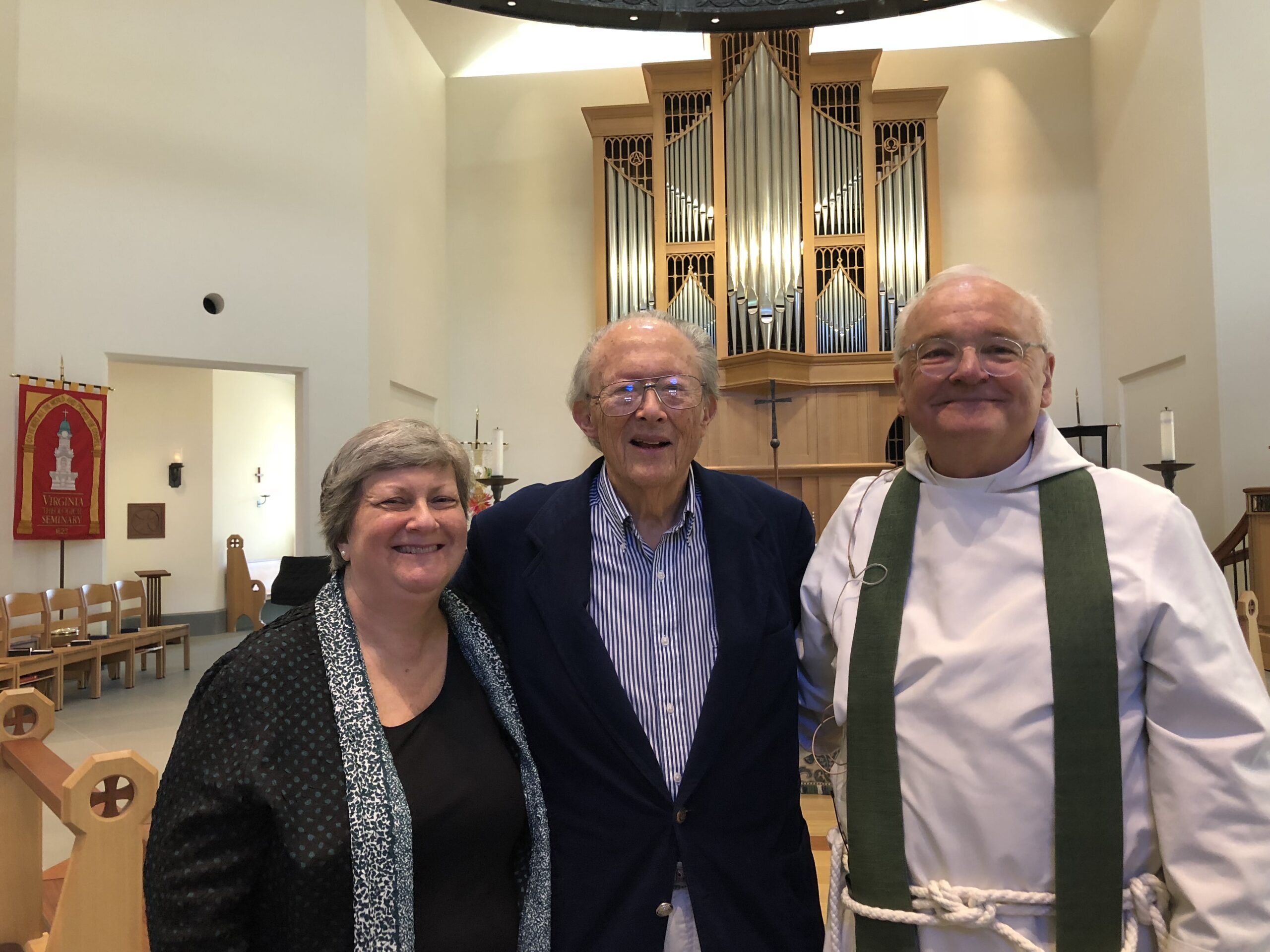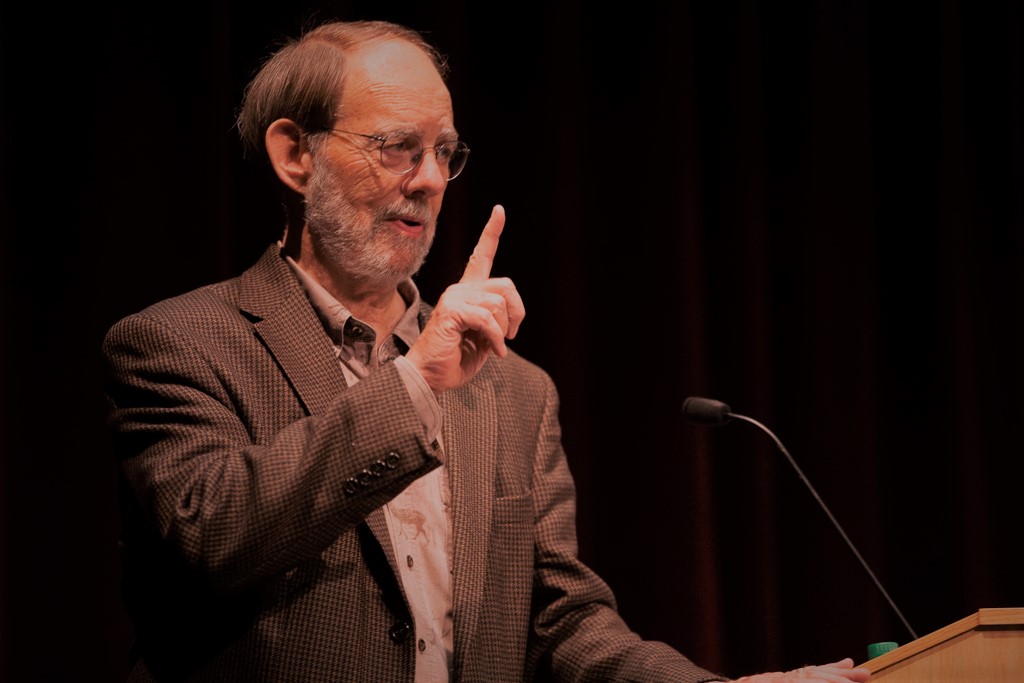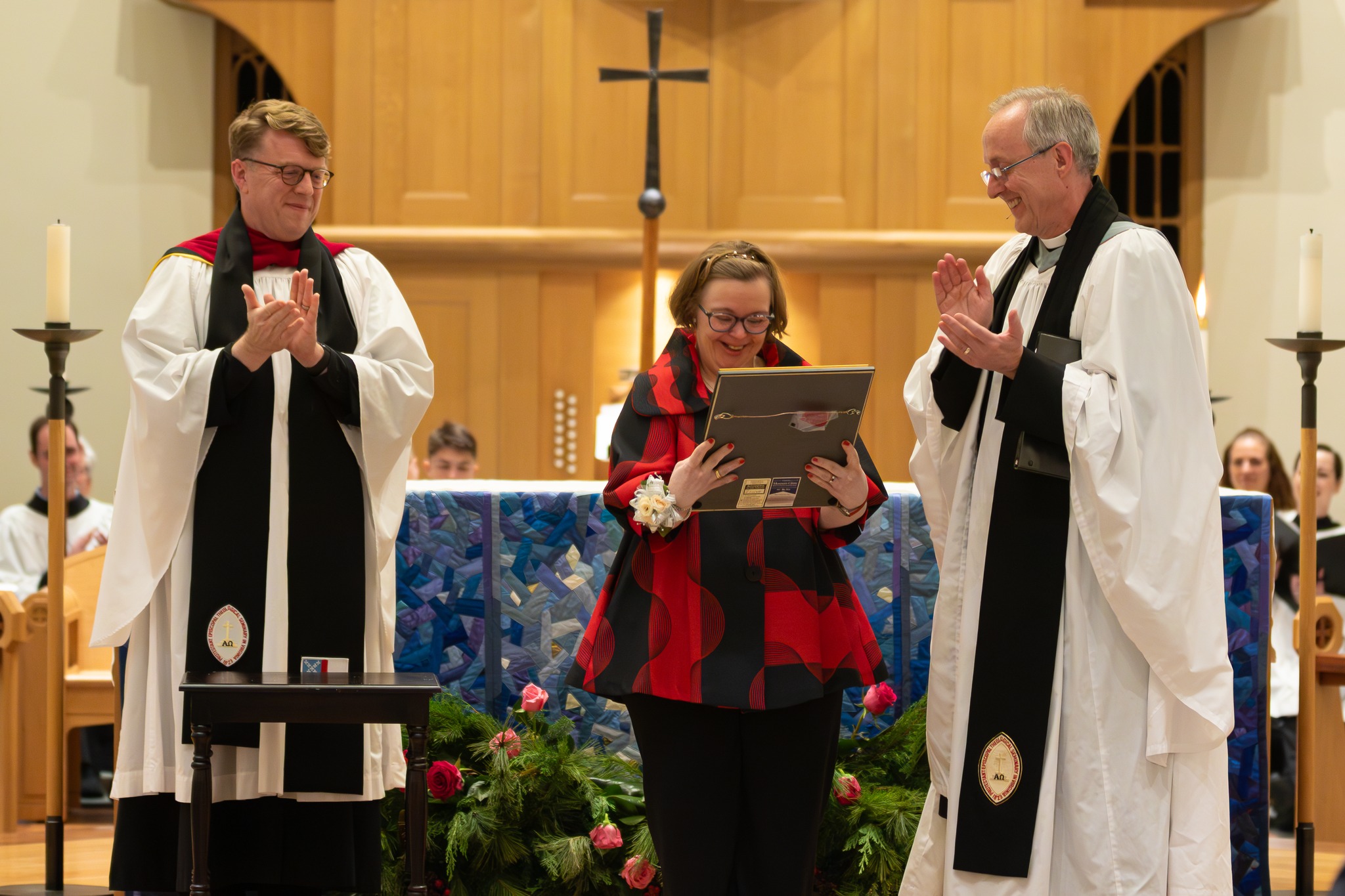
The Ministry of Mitzi Budde
Mitzi Budde, D.Min, Head Librarian and the Arthur Carl Lichtenberger Chair for Theological Research, retires after 33 years. The Rev. A. Katherine Grieb, Ph.D., ’83, reflects on the profound impact she has had on VTS.
Together we make The Episcopal Church stronger

The Very Rev. Ian S. Markham, Dean and President of Virginia Theological Seminary, looks ahead to the challenges the Church faces and how VTS will respond to them.
The Historic Bicentenary was a milestone that was right and proper to mark. It was an opportunity to reflect on the past in all its complexity. We acknowledged our deep complicity and participation in the evil institutions of slavery and segregation. Instead of telling a partial story about the past – one focused on the prominent – we sought to tell the complete story.
We focused on the past, with a view to changing the present and creating a new future. It is to that future that we must now turn our attention. There will be continuities with the past: we will continue to witness to the truth of the Gospel, the saving power of Christ, and the vital importance of The Episcopal Church. But there will also be some differences. The world has changed, and for the Seminary to be effective, we need to recognize those changes.
We must continue to find a balance between our internal rhythm of “class, chapel, lunch” and our external obligations and expectations. The internal rhythm creates the space that God can use for the formation of human lives to live the Gospel; the external obligations make us alert to the demands of the future Church and of the world.
Our moment is, in many ways, paradoxical. The Episcopal Church is declining, yet we have a clergy shortage. American is seeing a dramatic increase in “nones” (those claiming no religious affiliation), while conservative churches are no longer growing. Indeed, the fastest declining denomination is the Southern Baptists.
Digging into the numbers more closely reveals many complex trends. Granted membership numbers for The Episcopal Church have seen precipitous decline from a high of 3.4 million members in 1960, to just 1.58 million in 2022. Average Sunday attendance has been more stable, with the 1990s seeing a modest increase in attendance to 850,000. However, the combined impact of schism and secularism saw this figure decline to 373,000 people in 2022. COVID was especially problematic. Across the mainline denominations, the number of vocations to holy orders has also declined. The Association of Theological Schools reports an almost 50% drop in enrollment to Master of Divinity (M.Div.) programs for the mainline denominations during the past 30 years.
Yet our Episcopal schools and Episcopal retirement communities remain robust and strong, and none of these are counted in our official statistics. Neither do we count online participation, nor those who participate in events and meetings during the week. Responding to these mixed trends is a key responsibility of the Seminary as we look ahead.

Students at the 201st Commencement.
The heart of our work remains the task of explicating and expounding the faith. As a graduate school with an exceptional faculty, we need to continue to push forward the frontiers of the key disciplines. In terms of the underlying trends in modernity, there are many that are very sympathetic to faith. In respect to science, the reductionist and materialist worldview has been exposed as deeply misguided, and in respect to the sense of the transcendent, there is ample evidence that the quest for the spiritual is as vibrant as it has ever been. We can build on these trends. In addition, in terms of providing an account of the faith that takes seriously the interreligious dimension, the need for social justice, and that recognizes the need to listen to the experience of LGBTQIA+ persons, Virginia Theological Seminary is ready to do this work.
All of this work is supplemented by our specialism in practical theology and congregational studies, which will enable us to confront the secularizing trends of non-participation in congregations. This trend is the heart of our problem. We are not facing an environment where people are aggressive atheists. In fact, for many, the world is still very enchanted, but a decline in people’s willingness to participate in a congregation which requires joining, giving, and being committed, is undermining the vitality of our tradition. The future will have to include different ways of belonging to church.
The framing of the Seminary’s work as we embrace our next century of service against this backdrop can be shaped by four key words: Global, Episcopal, Residential, and Abiding.
One cannot be trained as an Episcopalian without taking the global dimension of Anglicanism seriously. We are a worldwide church, with the majority of our members now in the Global South. We need to listen and learn from the changing nature of Anglicanism which is emerging around the Communion. Our commitment to training students from overseas is deep in our institutional DNA. The Seminary has 3,317 alumni serving in 143 dioceses and 54 countries, including 114 serving as Bishops worldwide. Our ethos is already making a difference in countless different countries. We will continue this work, and we will do so alert to the destructive impact of colonialization. Being part of a global family is a key part of our identity.

The Bicentennial Banner, a gift from the Classes of 2023, 2024, and 2025. Photo: Rashid Mahdi, Six Half Dozen
We provide training in a tradition. Anglicanism was birthed in between Geneva and Rome. We retained the historic Episcopate; we built on the liturgies of the undivided church prior to the Reformation; and yet we simultaneously committed to a biblical and evangelical ethos of the Reformers. In its American form, The Episcopal Church has continued to engage with more contemporary trends and has provided a global witness to the obligation to listen to those who have been traditionally excluded, such as our siblings who are LGBTQIA+. We will continue to believe that it is important to be trained in a tradition: one needs a method of inquiry that justifies religious claims. Everyone who is trained at VTS will know how Episcopalians think and how they do theology. Simultaneously, given our ecumenical roots, we are a tradition that remains open to listening, learning, and understanding from other worldviews.
The work of being trained in a tradition takes place in a residential context. We believe that presence and proximity are part of the processes of formation. It is not just the lecture that shapes us, but the subsequent conversation over the lunch table. Indeed, the latter often has a more significant impact than the formal learning. Deep friendships emerge between our students as they study together. We continue to draw students from across the spectrum – conservative and liberal, Republican and Democrat. Meanwhile, students from overseas get to know Americans, resulting in different worldviews being shared, with both groups enhanced by the experience.
The mantra of the Seminary remains “Class, Chapel, and Lunch”. Class captures our responsibility as an exceptionally solid graduate school, with erudite faculty leadership, all of whom have a significant profile in their academic discipline. Chapel captures our obligation to participate in at least one act of corporate worship together. The goal is to instill a habit. Every day needs the pause where one sits with our Lord and allows God to shape and mold us. Spending three years in a residential seminary starts the process that we trust will stay with our graduates. We trust that our graduates learn that a day without the pause is a day that feels strange and incomplete. Lunch is the act of participating in table fellowship, sharing a table with strangers and friends, exchanging views with a person who has a completely different life experience to you.
One growing feature of the lunch experience is the presence of descendants. We introduced our Reparations Program in 2019, and now have more than 230 descendants who are involved. They are all invited to come to lunch during the week. Our residential experience is also an encounter with our commitment to make sure that the future is different from the past.
Our commitment to being a residential seminary will continue to be an absolute, but the precise shape of the residential experience will change. There will always be people who want to commit to a three-year M.Div. in residence; and, in a seminary landscape where the opportunity to do so is increasingly rare, we will continue to offer this option at VTS. However, there are others who will need a more flexible residential experience. So, perhaps in the future, there will be a two-year Masters in Ministry or a hybrid program with residence over several weeks across the year. We can provide all of these options.

VTS students on Thank You Day.
Part of our Bicentennial was a campaign to refresh the campus and support our programming which culminated in raising a total of $62 million. As we engaged with friends and alumni of the Seminary, one reoccurring theme was people’s desire to support an institution where their gifts were secure, an institution they had confidence would continue to be working for mission and ministry long into the future.
We seek to be good stewards of our resources. The priority is the students. So, we now offer every admitted full-time, residential student a full scholarship package covering tuition, housing and a meal plan. Naturally, we still need dioceses and congregations to help their students with other expenses, such as their health care plan, but we are seeking to make sure that cost is not an obstacle to training at VTS. In addition, we seek to honor “intergenerational equity” – in other words, we do not steal from the future for programs in the present. Our draw rate from our endowment is 4%, and we seek to set aside 25% of the money we receive through the Lettie Pate distribution each year. We also strive to make maintenance a priority, as deferred maintenance can be a burden for subsequent generations.
The key to our discipline is the continuing affection and support of our friends and alumni. It is your support through giving to the annual fund that enables us to maintain this financial discipline. Every generation of VTS supporters has had the same attitude: we are grateful for those who supported this place in the past; now we seek to be the persons in the present that bequeath a strong VTS to the future.
Our focus at VTS must be to make The Episcopal Church stronger and to make the Church catholic stronger. It is not an achievement to be an island of strength in a sea of denominational disintegration. Our interest is not simply to make sure that VTS is alright, but to enable the Christian tradition to be alright too.
To this end, we have three important tracks that are central to our work in the years ahead. First, we are continuing to ensure that our own self-identity as a school is one that recognizes the sins of the past and is committed to a future that is different. Authenticity is a Gospel obligation. We cannot teach a Gospel of repentance and not live a Gospel of repentance. We cannot call for a future which is different from the past and imagine that nothing must change in the present. We cannot expect a world suspicious of a church that can be counted on to support the ugly status quo to be persuaded to give us a second chance, unless we challenge that ugly status quo. As a result, reparations is central, not incidental to our work today.
Second, we are continuing to provide a range of services to congregations that support congregational vitality. This work is the focus of Lifelong Learning at VTS. Increasingly, they are trusted by the Lilly Endowment and Trinity Church Wall Street with significant resources that help support this ministry. From Baptized for Life, which helps all people to discern their vocations by virtue of being a baptized Christian, to Mutual Ministry, which thinks of leadership in a holistic way that includes the lay people, this work is impactful, important, and, most significantly, supportive of our tradition.
Third, we play a constructive role in the ecosystem of theological education. Herein is the Affiliation Agreement with The General Theological Seminary (GTS). If you look at our sister denomination, the United Church of Christ, the decline in its witness started in its seminaries. It was when, as a tradition, it could not sustain its seminaries that congregational leadership was undermined, and so a spiral of decline set in. VTS could have remained an island of strength, but such an approach is not in the interests of our Church.
The affiliation is already having a vitally important impact. An alternative to the traditional three years of residential seminary is now available to people seeking to follow their call. Thanks to the affiliation a range of services are provided that guarantee a high-quality educational experience. Some faculty are shared between both seminaries, the library services for GTS are now outstanding and especially strong in terms of e-resources; and everything from placement services to leadership support are part of the affiliation.
Alone VTS would never have added a hybrid option for the training of clergy. Thanks to the affiliation, we now have a hybrid option in our orbit. As the world changes, VTS is now ready for such changes.

The Very Rev. Ian S. Markham, Ph.D., Dean and President of VTS. Photo: Rashid Mahdi, Six Half Dozen
It is truly an honor to be serving as the Dean and President of VTS in this season. I am grateful every day. The strength of this place is not simply financial or faculty or staff, but also an attentive Board, with volunteer Trustees willing to give generously of their time for the Seminary. It is an amazing group of alumni and friends who give, pray, and care.
We have navigated the first 200 years. We now look ahead to the next 200 years. May we be faithful to the God disclosed in the Eternal Word made flesh. May we be effective and ensure that a generous, inclusive witness of The Episcopal Church continues now and into the future.

Mitzi Budde, D.Min, Head Librarian and the Arthur Carl Lichtenberger Chair for Theological Research, retires after 33 years. The Rev. A. Katherine Grieb, Ph.D., ’83, reflects on the profound impact she has had on VTS.

The Thomas Dix Bowers Preaching Fellowship Fund was established at Virginia Theological Seminary on May 6, 2008, by family and friends of the Rev. Dr. Thomas Dix Bowers, VTS ’56.

The Rev, Rode Molla, Ph.D., Assistant Professor, and the first Berryman Family Chair for Children’s Spirituality and Nurture at Virginia Theological Seminary, reflects on the legacy of the Rev. Jerome Berryman, D.Min.

Virginia Theological Seminary was honored to confer the Dean’s Cross for Servant Leadership on Ellen Wofford Hawkins in recognition of her deep faith and ability to bring sunshine into the lives of others.